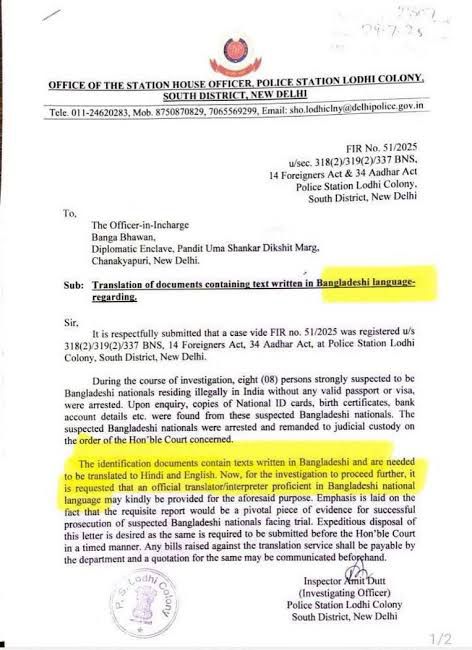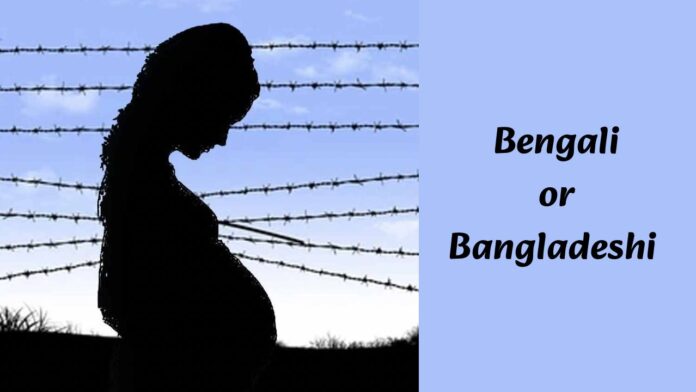In 2023, the passport of Dr. Tamal Dasgupta, a Hindu Bengali and professor of English at Dr. Bhim Rao Ambedkar College, Delhi University, was unexpectedly rejected by the Delhi Police. During verification, an officer asked his wife, “Are you Bangladeshi?”
She replied, “No, we are from West Bengal.” Yet, the passport was rejected without explanation. What appeared then as a bureaucratic aberration would soon seem like a warning of something larger — a system that looks at Bengalis with suspicion.
Two Years Later: The Pushback That Shocked Bengal
In June 2025, six migrant workers from Paikar in Birbhum district — among them Sonali Bibi and Sweety Bibi — were arrested in Delhi and accused of being illegal Bangladeshi nationals. They were taken to the Assam border and pushed back into Bangladesh.
One of them, Sonali Bibi, was eight months pregnant and mother of two small children. Her cousin Soeif Ali later said, “I have known their family since childhood. They were born in India, not Bangladeshis.”
Their deportation bypassed all legal procedure. Advocate Swapan Banerjee, appearing for the West Bengal government, told the Calcutta High Court that Delhi Police never contacted the District Magistrate of Birbhum, as required by law. The Foreigners Regional Registration Office (FRRO) sent the group to Bangladesh without state verification.
The Bengal government later sent all relevant documents proving their Indian citizenship to the Ministry of Home Affairs and the Delhi Police, but there was no response.
Legal Struggle and Centre’s Opposition
The families approached the Calcutta High Court, where Advocate Raghunath Chakraborty argued that the act was “completely unreasonable and unconstitutional.” The Division Bench of Justice Tapobrata Chakraborty and Justice Ritabrata Kumar Mitra directed all parties — the Centre, Delhi Police, and the State — to submit affidavits.
Despite clear evidence and the Bangladesh court’s finding that Sonali and Sweety are Indian citizens, the Central Government has now moved the Supreme Court to oppose their return to India.
Advocate Supratik Shyamal, representing the victims, called it “a direct violation of human rights and constitutional guarantees.”
When a Language Becomes Foreign
A disturbing glimpse into official attitudes comes from Delhi Police’s own documents. An FIR (No. 51/2025) from Lodhi Colony Police Station, addressed to Banga Bhawan, contains the following line:
“The identification documents contain texts written in Bangladeshi language and are needed to be translated into English.”

Excerpt from Delhi Police FIR No. 51/2025, describing Bengali as “Bangladeshi language.” Source: Lodhi Colony Police Station, South District, New Delhi.
This is not a minor linguistic mistake — it is an institutional declaration that Bengali equals Bangladeshi. A constitutional language spoken by more than 100 million Indians has been labeled “foreign” by a government office.
By such reasoning, millions of citizens in West Bengal, Tripura, and Assam could be treated as outsiders in their own country.
“The identification documents contain texts written in Bangladeshi language…”
— Delhi Police FIR No. 51/2025.
The Human Cost of Bureaucratic Nationalism
At a gathering organized by the Tripura Hitsadhini Sabha at College Square, Aamir Khan, Soeif Ali, and Aamir Sheikh — relatives of the deported women — described their trauma.
Aamir Sheikh, who worked as a labourer in Rajasthan, said:
“I was caught, tied up, and dumped at the border. I am an Indian — but why this pain? Now I dare not go back to Rajasthan.”
Meanwhile, Sonali Bibi’s two children in Birbhum ask a question no child should ever have to: “When will we meet Ma?”
These testimonies reveal the human cost of state suspicion — a creeping criminalization of Bengali identity that no longer distinguishes between language and nationality, between belonging and exile.
Justice Delayed, Citizenship Denied
Despite judicial intervention, at least 16 Indian citizens remain stranded in Bangladesh. Their legal documents, Aadhaar cards, and ration records have been submitted, yet their voices remain unheard.
The Calcutta High Court has demanded accountability, but the Centre’s resistance has turned a humanitarian crisis into a constitutional test case. The matter now lies before the Supreme Court, where the question is simple but profound — can language or accent make an Indian a foreigner?
Conclusion: A Nation Turning Against Its Own
Two years ago, when a Delhi University professor’s passport was rejected after his wife was asked, “Are you Bangladeshi?”, it seemed like an isolated humiliation. Today, it reads like a prophecy fulfilled.
From the classroom to the border fence, Bengalis — Hindu and Muslim alike — now face a gaze of suspicion. When even an official police communication can describe Bengali as “Bangladeshi language,” the problem is not administrative. It is moral.
If a professor’s family can be questioned and a pregnant mother can be deported, then the fear of statelessness is no longer theoretical. It is already here.
Bengali is not a Bangladeshi language. Bengalis are not foreigners. They are Indian citizens — and they deserve to live without fear.






